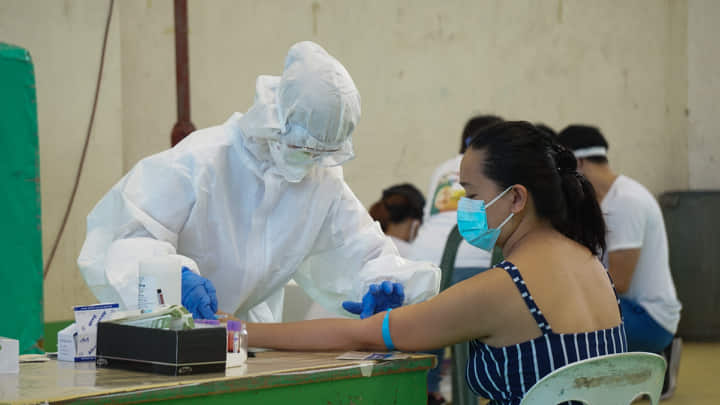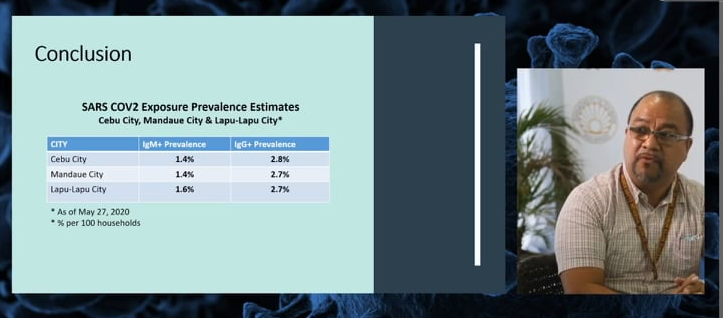Mass testing results: Experts say more ‘responded well’ to coronavirus

Scene from the Rapid Mass Testing being conducted at the Vicente Sotto Memorial Gym in Barangay Punta Princesa on Friday, May 8, 2020. | CDN Digital Photo Gerard Vincent Francisco
CEBU CITY, Philippines — Most communities covered by the rapid antibody tests from Cebu’s three largest cities were found to have ‘responded well’ to the coronavirus disease 2019 (COVID-19), health officials here claimed.
Results of the Project Balik Buhay (PBB), the ‘strategized community testing’, which were conducted to 42,645 households from the cities of Cebu, Mandaue, and Lapu-Lapu, were presented on Friday, May 29 through an online press conference.
Read more: ‘Strategic’ mass testing for COVID-19 to be conducted in Cebu, Mandaue and Lapu-Lapu
Data showed by health officials from the Department of Health in Central Visayas (DOH – 7) showed that the prevalence percentage from all three cities found to have antibodies upon recovery (IgG) was greater than those with antibodies upon infection (IgM).
“Because of the IgG prevalence, dinha nimo makita na (that is where we can see), despite our situation in the three cities here… with the IgG prevalence mas taas pa man gani kaysa sa (it is even higher than the) IgM prevalence, makita nato (we can see) that in all probability, the Filipinos can have that resilience in terms of the immune response of the coronavirus,” said Dr. Mary Jean Loreche, DOH-7 chief pathologist.
Dr. Jaime Bernadas, DOH-7 director, who agreed with the findings, said these corroborated with the region’s statistical reports on COVID-19.
“That really corresponds to the statistics that we are having since 80 percent are asymptomatic. The 80 percent which is the asymptomatics are the people responding well to the virus,” said Bernadas.
“And these are the most critical segment of the population because they go around unnoticed and transmit the virus to the vulnerable,” he added.
Watch: May 29 press briefing on findings of Strategized Community Testing
In epidemiology, prevalence is the term used to describe the proportion of a particular population affected by a disease in a specific period.
For PBB, Dr. Junjie Zuasula, Regional Epidemiology and Surveillance Unit in Central Visayas (RESU-7) head, said 10 percent of the total households of each city was ‘randomly chosen’ to undergo tests.
This means that of the 175, 364 households in Cebu City, 17, 255 were identified to undergo rapid antibody tests.
However, only 15,255 households in Cebu City were successfully screened, resulting in a turnout rate of 87 percent only.
“But that 87 percent is already a big response rate. Seventy percent is our threshold of the results,” Zuasula said.
READ MORE: DOH-7: 15K samples from rapid test in Cebu City enough for data analysis
Mandaue and Lapu-Lapu recorded 12,059, and 15,340 households that participated in the tests respectively. Both cities are beyond their targets.
Rapid antibody tests for PBB started on May 6 in the tri-cities and ended on May 21 after posting a turnout rate of 108 percent.
One of the program’s objectives was ‘to determine the prevalence rate of SARS-CoV-2, the virus that causes COVID-19, exposure in the barangays of Cebu City, Mandaue, and Lapu-Lapu’.
Its utilization of rapid antibody tests, however, was met with scrutiny both from citizens and public officials following an earlier warning from the Food and Drug Administration (FDA) that such test kits could render false positives and negatives.
But in compliance with guidelines from the DOH’s central office, those who tested positive of antibodies, particularly those with IgM, also underwent swab extraction for real-time polymerase chain reaction (RT-PCR) tests to confirm the presence of SARS-CoV-2.
Loreche said using rapid antibody test kits would help health experts determine how immune systems of individuals respond to infection such as the coronavirus.
Prevalence Rate
In Cebu City, health experts said that the prevalence rate of individuals positive of IgG was 2.8 percent for every 100 households.
The cities of Mandaue and Lapu-Lapu shared the same IgG prevalence rate of 2.7 percent for every 100 households in their respective jurisdictions.
Meanwhile, the prevalence rate for households found out to have antibodies upon infection (IgM) was only at 1.4 percent both for the cities of Cebu and Mandaue, and 1.6 percent for Lapu-Lapu City.

Screenshot from OPAV’s Facebook live video. On the right panel is Dr. Junjie Zuasula, head of RESU – 7.
“With these results, pasabot naa gyud diay ang kagaw sa palibut (this will mean that the virus is in our surroundings). And then we also saw naa nasad gyud nahuman na ang infection kay between 3 percent of the population per 100 households have already been exposed (to COVID-19),” said Zuasula.
Recommendations
With the results in, Zuasula said they had come up with several recommendations for local governments on how to respond to the COVID-19 pandemic such as a ‘sequential unlocking’ of certain barangays.
Unlocking a barangay that had been placed under lockdown should be done in a ‘sequential manner’ as an added precautionary measure, Zuasula said.
He said that they would be furnishing the complete results and recommendations of PBB to local government officials ‘as soon as possible’. /dbs
Disclaimer: The comments uploaded on this site do not necessarily represent or reflect the views of management and owner of Cebudailynews. We reserve the right to exclude comments that we deem to be inconsistent with our editorial standards.
